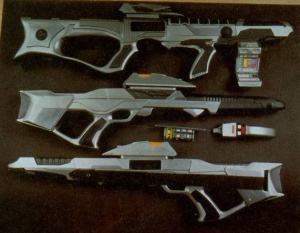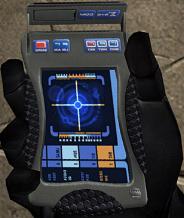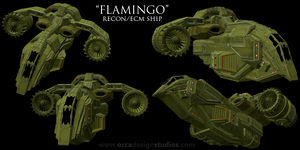StarBase 118 Ops Marine Weapons & Equipment
| StarBase 118 Ops | ||
|---|---|---|
 ACTIVE STATUS | ||
| ||
Marine equipment is similar to fleet standard, though there are differences and most of the weapons can be fitted with expanded power supplies for long-term missions.
Weapons
Cutlass
It may be ancient, but the cutlass is traditional, dating back hundreds of years. Marines carry them in dress situations and in combat. The modern cutlass has a collapsing blade comprised of a baakonite/tritanium alloy, and can be electrified to be used as a baton during crowd control scenarios.
Type IIIC Phaser Rifle
The marines carry a modified version of this weapon, equipped with an underslung photon grenade launcher, a stun bayonet and an improved holographic targeting system.
Photon Missile Launcher Attachment
Used on "search and destroy" missions, a marine might be outfitted with a photon missile launcher attachment that can be fitted to their sidearm, an enhanced Type IIA phaser.
Type III SOCOM Carbine Phaser Rifle
On covert missions, the marines have been known to carry Type III SOCOM carbine phaser rifles, fitted with various accessories on RIS mounts.
Other Tools
Combat Tricorder
The combat tricorder is a specialized tricorder carried by Starfleet expeditionary forces. Along with basic tricorder functions, the combat tricorder is programmed with strategic and tactical information and countermeasures.
Vehicles
Peregrine-Class Fighter
Peregrine fighters carry phaser cannons and micro torpedo launchers. They are also outfitted with pylons for fitting up to eight photon torpedoes. It's defenses are deflector shields and decoy drones and it carries 1-2 crew.
- Vehicle Type: Warp Pursuit/Patrol Fighter.
- Crew: Two (Pilot and Weapon Officer)
- Statistical Data
- Length: 59.1 feet (24.4 meters)
- Height: 19.1 feet (5.82 meters)
- Width: 57.4 feet (17.5 meters)
- Weight: 27.5 tons (25 metric tons) (Daystrom Institute Technical Library)
- Power System: Advanced Micro Fusion with 5 year life span.
- Cargo: Small Storage Space, 3 feet x 4 feet x 4 feet. Used for emergency equipment and weapons.
- Market Cost: 95 million to construct.
- Landing: Fighter is able to land on the ground, but driving on the ground is not possible.
- Length: 59.1 feet (24.4 meters)
- Speed
- Sublight Propulsion: Standard impulse drive.
- Atmospheric Propulsion: Designed for atmospheric entry and performance, the fighter's maximum cruise speed is Mach 8.5 at 101,325 Pa (1 Standard Atmosphere).
- FTL Propulsion: Uses a warp engine that allow ship to travel at Warp Factor 4.8 on cruise (0.017 LY / hour), Warp Factor 5.6 Flank (0.036 LY / hour ), and Warp Factor 7.2 Emergency (0.082 LY / Hour).
- Range: Short. Fighters carry neither the fuel nor the supplies for their pilots to carry out extended missions without support.
- Pfighter.jpg
Peregrines size comparison with Akira-class vessel
- Pygorian.jpg
Side View
Statistical data acquired from www.kitsune.addr.com, Star Trek Expanded Universe Wikia, and Memory Alpha.
Mule MK9 & MK10 "Locust"
| Mule MK9 "Locust" | Mule MK10 "Locust" |
|---|---|
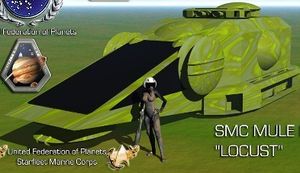 Image and specs by Iolo Llewelyn Multi-Use Land Excursion Vehicle Squad-Level Troop Transport
|
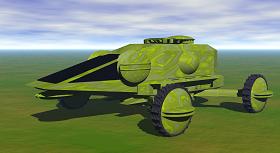 Image and specs by Iolo Llewelyn |
Flamingo Class Recon/ECM Vessel
Though a relative old model compared to many Marine ships currently in service, the Flamingo remains a reliable component of Starfleet Marines operations. The main reason for the vessel's longevity - having been in active service for nearly sixty years - is its versatility. The Flamingo was designed to be employed as a recon craft for both military and search & rescue operations, an electronic countermeasures (ECM) ship for space combat situations and as a light troop/personnel transport.
In most situations, the Flamingo is capable of carrying one pilot in its cockpit area and up to twelve others in its main body. The exception is during ECM missions, during which larger ECM control consoles swing out from interior walls, decreasing capacity to one pilot and six others, including the ECM operator.
Originally designed for atmospheric flight, the Flamingo was retrofit with both warp and impulse engines thirty years ago. However, the warp performance of the Flamingo Class has proved to be unreliable and it is generally only deployed in situations that require impulse or atmospheric flight. Warp travel in a Flamingo is recommended only for very short distances.
Armament includes front-facing phaser pulse cannons and an optional compliment of twenty-four photon torpedoes.
| Dangerous Company, the Marines of Starbase 118 |
| Dangerous Company Facilities · Weapons & Equipment · K-9 Unit Rank Comparison · Uniforms |
| Edit nav |

